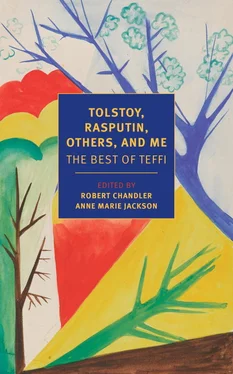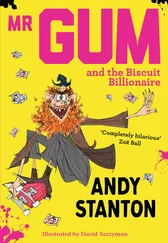I didn’t have long to think it over. The next day an official letter came in the post, giving me the date of the first night and informing me when rehearsals would start. I was invited to attend.
Everything was out in the open. My lines of retreat had been cut off. This was rock bottom. Since nothing could be more terrifying, I could now give serious thought to my situation.
Why exactly had I decided the play was so very bad? If it was bad, they wouldn’t have accepted it. That they had accepted it could only be thanks to the good luck of the fool whose name I had taken. If I had signed the play “Kant” or “Spinoza”, they would surely have rejected it.
I needed to pull myself together and go to the rehearsal. Otherwise they might try to track me down through the police.
Along I went. The play was being directed by Yevtikhy Karpov, someone suspicious of any kind of innovation, a man of the old school.
“Box set, three doors, and your lines from memory—rattle them off facing the audience.”
He greeted me with condescension. “So you’re the author, are you? All right. Find yourself a seat and keep quiet.”
Need I say that I did indeed keep quiet? Up on stage a rehearsal was underway. The young actress Grinyova (whom I sometimes still see here in Paris—she has changed so little that when I look at her my heart flutters as it did back then…) was in the lead role. She was holding a crumpled handkerchief that she kept pressing to her mouth—the latest mannerism among young actresses.
“Stop muttering under your breath!” shouted Karpov. “Face the audience! You don’t know your lines! You don’t know your lines!”
“Yes I do!” said Grinyova, offended.
“Oh do you? All right then. Prompter—not another word from you! Let her stew in her own juice—like a sprat in a pan!”
Karpov was a bad psychologist. No one would remember their lines after intimidation like that.
Oh this is dreadful, I thought, really dreadful! Why had I even written this dreadful play? Why had I sent it to the theatre? The actors were suffering—being forced to learn all this claptrap of mine by heart. And now the play was going to fail and the papers would write, “It is a shame that a serious theatre should be wasting its time on such nonsense when people are going hungry.” And then, when I went to my grandmother’s for Sunday breakfast, she would give me a stern look and say, “We’ve been hearing things about you. I very much hope they’re untrue.”
Nevertheless I carried on going to the rehearsals. I was amazed by the friendly way the actors greeted me—I had expected them to hate and despise me. Karpov laughed loudly and said, “The poor author’s wasting away. She’s getting thinner and thinner.”
The “poor author” held her tongue and tried not to weep. And then came the point of no return. The day of the performance. To go or not to go? I decided to go but to find myself a place somewhere at the very back where no one would see me. After all, Karpov was capable of anything. If the play flopped, he might stick his head out from the wings and shout, “Leave this theatre and don’t come back, you fool!”
My little play followed a long and extremely tedious four-act work by some novice. The audience was bored—yawning and whistling its disapproval. Then, after the last jeering whistle and after the interval, up went the curtain and my characters began to prattle away.
“Utterly dreadful!” I was thinking. “What a disgrace!”
But the audience laughed once, laughed again, then began to enjoy themselves. I promptly forgot I was the author and laughed along with everyone else as old Yevgenia Yablochkina played a woman general marching around the stage in uniform and tooting martial fanfares with no instrument but her lips. All in all, the actors were very good. They did my play proud.
“Author!” the audience began calling out. “Author!”
What was I to do?
Up went the curtain. The cast took a bow and made a show of searching for the author.
I leapt from my seat and began to make my way down the aisle towards the wings. Then the curtain came back down, so I returned to my seat. But once again the audience called for the author, and once again the curtain went up, the cast took a bow and someone on stage shouted, “But where’s the author?” Once again I made for the wings, but once again the curtain came back down. And so it went on. I carried on dashing backwards and forwards until someone with a shock of wild hair (I learnt later that this was Alexander Kugel) grabbed me by the arm and bellowed, “For the love of God—she’s right here!”
But at this point the curtain, after going up for the sixth time, came down once and for all. The audience began to disperse.
The following day I had my first ever conversation with a journalist, who had come to my apartment to interview me.
“What are you working on right now?”
“I’m making some shoes for my niece’s doll…”
“Oh really? And what does your pseudonym mean?”
“It’s… the name of a foo… I mean it’s a surname.”
“Someone said it’s from Kipling.”
Saved! I was saved! There is indeed such a name in Kipling. And not only that, but in Trilby there’s a little ditty that goes:
Taffy was a Wale-man,
Taffy was a thief… [1] Taffy is the name of a young British art student in Trilby , a novel by George du Maurier; it is also the name of a young girl in one of Rudyard Kipling’s Just So Stories. And “Taffy was a Welshman” is the first line of a well-known English nursery rhyme. Teffi gives these two lines in English, misquoting and misspelling as here. She is, presumably, reproducing how she used to say these lines as a child. In this apparently autobiographical article Teffi is, as always, being playful. In reality, she first used the pseudonym “Teffi” as early as 1901, six years before the first performances of The Woman Question (Elena Trubilova, in Na ostrove moikh vospominanii (Tikhvin, 2016), p. 12).
It all came back to me straightaway. Yes, of course, it was from Kipling!
Beneath the photograph of me that appeared in the newspapers was the word “Taffy”. [2] Not all English vowel sounds have exact Russian equivalents. The standard Russian transliteration of “Taffy” is “Тэффи” (Teffi).
That was it. There was no going back.
And so it remains.
1931 Translated by Anne Marie Jackson
MY FIRST VISIT TO AN EDITORIAL OFFICE
My first steps as an author were terrifying. I had never, in any case, intended to become a writer, even though everyone in our family had written poetry from childhood on. For some reason this activity seemed horribly shameful, and should any of us find a brother or sister with a pencil, a notebook and an inspired expression, we would immediately shout out, “You’re writing! You’re writing!”
The guilty party would begin to make excuses and the accusers would hop around, jeering, “You’re writing! You’re writing!”
The only one of us above suspicion was our eldest brother, a creature suffused with sombre irony. [1] It is unclear whether Teffi had one or two elder brothers. There is documentary evidence only for one elder brother, Nikolai Lokhvitsky (1867–1933), who attended military school and by the end of the First Word War had attained the rank of lieutenant general. Here, however, we have an elder brother attending a lycée rather than a military school and there are two other stories (“Love” and “The Scarecrow”) in which Nikolai is presented as the second of two brothers (Haber, chapter 1). The biographical truth is, at present, impossible to establish with certainty. On the one hand, Teffi presents her stories simply as stories, not as biographical memoirs; on the other hand, it is odd that she so often mentions having two brothers.
But one day, when he was back at the lycée after the summer holidays, we found scraps of paper in his room covered in poetic exclamations, and one line repeated over and over again:
Читать дальше












